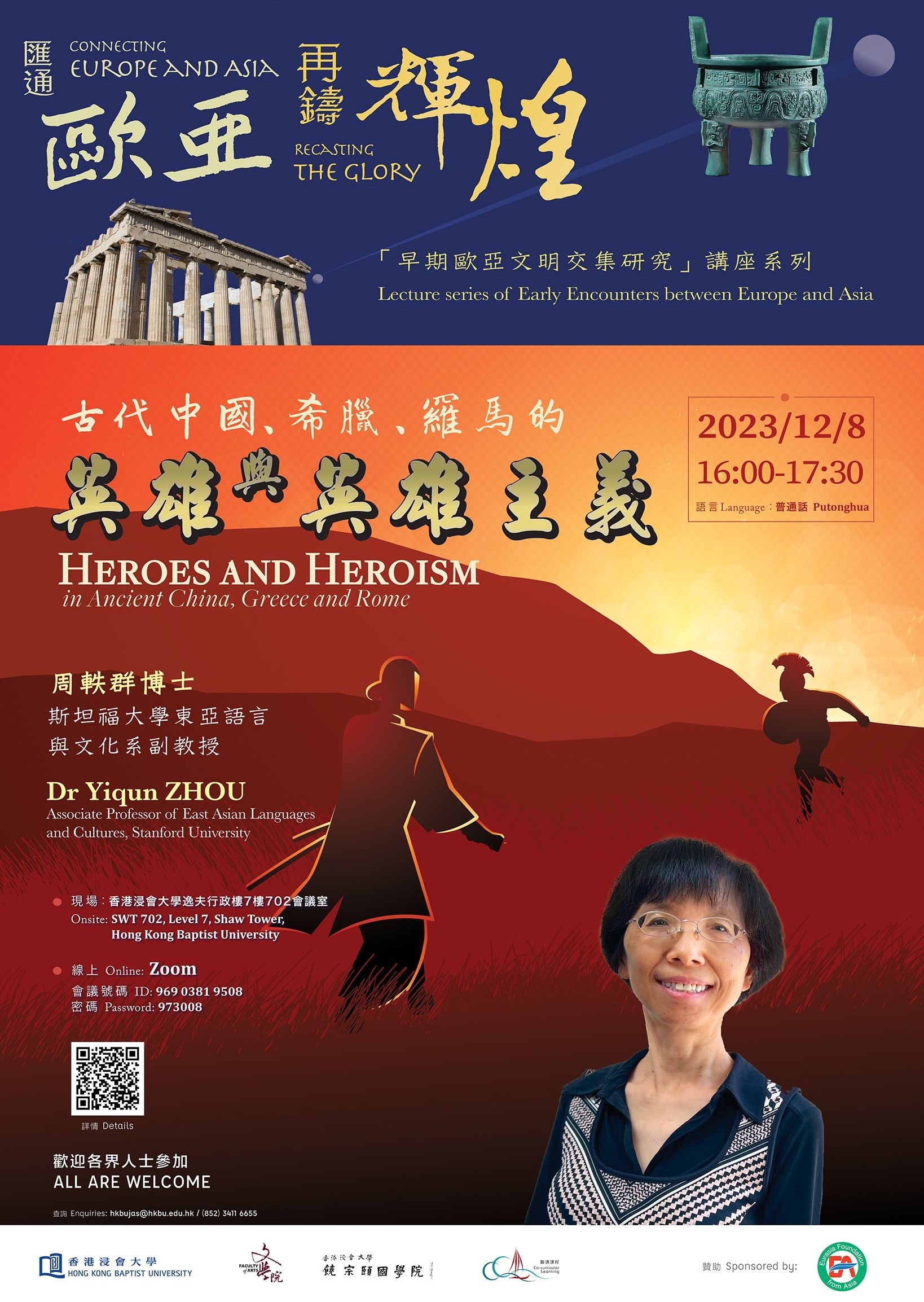
Connecting Europe and Asia, Recasting the Glory: Lecture series of Early Encounters between Europe and Asia
Lecture 11: Heroes and Heroism in Ancient China, Greece and Rome
2023/12/8│16:00–17:30
Dr ZHOU Yiqun
Associate Professor of East Asian Languages and Cultures,
Stanford University
- Abstract:Based on the classical traditions of China, Greece, and Rome, we investigate the following questions: What qualities and experiences must a hero possess? What is the relationship between courage and virtues such as integrity, loyalty, resilience, and self-sacrifice in the definition of a hero? To what extent can heroism coexist with fear, pain, and shame? What role do education and role models play in a hero's journey to becoming a hero? What is the ethical significance of heroism? Does the standard of heroism differ by gender? Lastly, how can understanding different cultures help us answer the above questions?
- Language: Putonghua
- Summary (Recorded by Guan Jinglin)
The subject of this lecture, given by Dr Zhou Yiqun, originated in Stanford University’s course ‘Freedom in Education’, whose hope is that, through exploration of comparison of heroes and heroism across different cultures, students can be helped to formulate modes of thought and an awareness of self that could even be lifelong.
In this lecture, Dr Zhou first reiterated the importance of emulation to education. She reflected on the encouragement of individual creativity in Western education and the problems that this has brought along. She suggested instead that education should not neglect its traditional functions and should appropriately return to classical writings and the emulation of models, and only by doing so can the tradition be sustained.
Dr Zhou then gave a detailed introduction of ‘family trees’ of Chinese and Western heroes and heroism. Ancient Greek heroes of Western civilisation were celebrated for their bravery and battlefield honours. From Achilles to Alexander the Great and onwards to Julius Caesar, the ‘genealogical’ relationship between them is crystal clear, and subsequent generations took their forebears as examples worthy of emulation, modelling themselves on those who had come before to achieve their own success. Of particular interest is the fact that the philosopher Socrates regarded Achilles as his model in the same way, and when faced with humiliation and death, he cited the deeds of Achilles and copied him. Unwilling to suffer disgrace, he bravely sacrificed himself, resolutely guarding his mission and responsibilities. These are the core values of Western heroism.
Chinese heroes, on the other hand, tend to be cultural heroes. Beginning with King Wen of Zhou and reaching forward to King Wu of Zhou, Duke Zhou, Confucius, Sima Qian, and so on, all are sagely and virtuous. In parallel to the Western world, Chinese heroism also discusses the relationship between humiliation and bravery. Zhongyong (The Doctrine of the Mean) gives: ‘To know humiliation is close to bravery.’ Bao Ren An shu (Letter to Ren An): ‘He who is humiliated is the epitome of bravery.’ From this, it can be appreciated that the deciding factor as to whether a person is brave is a capacity for humiliation. Dr Zhou considers that Sima Qian took humiliation and transformed it into a creative cultural force, moulding it into a form of bravery and writing a ‘family tree’ of Chinese cultural heroes in the process, thus taking Chinese-style cultural heroes and explaining them as ‘individuals possessed of extreme noble generosity’.
In addition, stories of Chinese and Western heroes and their methods for dealing with conflicting familial or national loyalties give us food for thought. Dr Zhou introduced the Chinese male hero Shun and the ancient Greek female heroine Antigone. In both instances, when faced with conflict between loyalty to family or country, the two heroes chose family members in preference, but the Western version of how a heroine deals with problems between family and country would appear to reflect partisanship in respect of heroism and issues of gender.
Finally, from a cross-cultural perspective, Dr Zhou shared the modern echoes she has perceived of the ancient world in both East and West, for example, Ji Junxiang’s The Orphan of Zhao and Voltaire’s L’Orpelin de la Chine. Dr Zhou considers that East and West can mutually foster understanding of the differences between them and promote beneficial interaction, and greater potential can here be explored.
- Lecture video
HKBUTube
Bilibili
This lecture series is sponsored by Eurasia Foundation (from Asia).